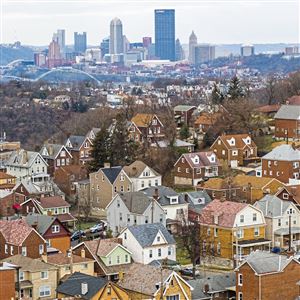A sunny relationship at the corner of Thomas Boulevard and Homewood Avenue got brighter last fall when Fred Kraybill installed an 11-kilowatt solar panel array there. Its output exceeds all the electrical needs of the huge house Mr. Kraybill co-owns beside it.
The array is 44 feet wide and 15 feet deep. I was heading north on Homewood Avenue when I first saw it in the spring, and I stopped because it was one of two attractions on that lot.
How had I not noticed the big garden growing there before? I had been on Homewood Avenue oodles of times. Maybe it took the solar array to yank my attention.
The first time I stopped, I read the sign: Shiloh Peace Garden, one of Grow Pittsburgh’s farm stand gardens. I walked around, admiring the deep green leaves of kale and chard; my plants were anemic by comparison. But there was no one around to ask about the solar panels.
Had Grow Pittsburgh found an angel to put those up? Then again, why would Grow Pittsburgh need solar panels?
Turns out the array has nothing to do with the garden. The two just live side by side.
I since returned to meet with Grow Pittsburgh’s executive director, Julie Pezzino; Mr. Kraybill; Brad Yoder, his partner in the Thomas Boulevard Group; and the garden’s manager, Cassandra Morgan.
Mr. Kraybill and Mr. Yoder are angels, of a sort. When they bought the side lot last summer, they could have given Grow Pittsburgh the boot. The garden had been there since 2007, when John Stahl-Wert owned the lot.
“John had welcomed us, wanting it to be preserved as a green space,” Ms. Pezzino said. “And much to our happiness, Fred and Brad said, ’We want you to stay.’”
“We would want it to look like this but don’t have the time to make it look like this,” Mr. Kraybill said.
“We love that we have this here,” Mr. Yoder said, “We agreed on a payment in vegetables.”
The Shiloh farm stand, on Thursdays from 3 to 7 p.m., is Grow Pittsburgh’s effort to provide healthy produce to people who depend on subsidies.
The attraction of the garden is also “a great opportunity to explain the concept of the solar array,” Mr. Kraybill said. He described himself as a “climate hawk” who has a passion for solar energy.
“Not a day goes by that someone doesn’t stop and ask about it,” said Ms. Morgan, manager of the greenhouse at the Frick Art and Historical Center in addition to the Shiloh garden.
Shiloh and the Frick greenhouse are two of Grow Pittsburgh’s production gardens. The other is Braddock Farms. They sell to the public and to restaurants. In the last four years, Grow Pittsburgh has started and supported 18 other gardens that community gardeners operate.
The relationship between Kraybill-Yoder and Grow Pittsburgh extends further to the rain barrels Mr. Kraybill installed all around the house. He also owns an electric car and, for good measure, wears a button that reads “wind power.”
The site will be on the Pittsburgh Solar Tour sponsored by Penn Future on Oct. 18.
The house there was once a funeral home. More recently it was the Pittsburgh Hospitality House. When its business ceased, Mr. Kraybill, Mr. Yoder and two others formed the Thomas Boulevard Group to buy it. The other two individuals have since left the partnership.
Solar power remains expensive for most people, but Mr. Kraybill is eager to tout the investment, considering the 30 percent tax credit you can get from the federal government.
“It is a fantastic policy that is driving solar industry growth,” he said.
The house has five apartments and uses $240 worth of electricity a month. Most houses would need about a quarter of the $40,000 system installed by Mr. Kraybill. But he said it should pay for itself in 10 to 15 years, factoring in the tax credit and the credit that appears on each month’s electric bill.
“You can actually see the meter run backward,” Mr. Yoder said.
Diana Nelson Jones: djones@post-gazette.com or 412-263-1626.
First Published: September 2, 2014, 4:27 a.m.

















